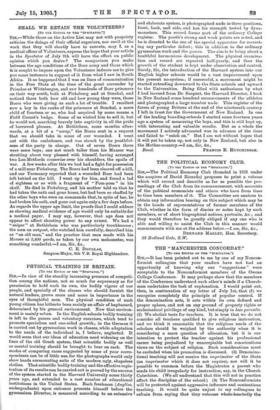SIE,—In view of the steadily increasing pressure of competi- tion
among the nations, not so much for supremacy as for permission to hold each its own, the bodily vigour of our people, and specially of the classes who should furnish the natural leaders, grows more and more in importance in the eyes of thoughtful men. The physical condition of each young citizen has hitherto been mainly an affair of haphazard, determined by his general environment. Now that environ- ment is mainly urban. In the English schools bodily training is left to the games and voluntary exercises, which tend to promote specialism and one-sided growth; in the German it is carried out by gymnasium work in classes, while adaptation to the needs of the individual is, I believe, neglected. It would seem that our ideas of education need widening on the lines of the old Greek system, that scientific bodily as well as mental training should be brought to bear on each. The modes of comparing races suggested by some of your corre- spondents can be of little use, for the photographs would only show heads surmounting suits of the modern ugly, shapeless clothes. That scientific bodily training and the effective regis- tration of its results can be carried out is proved by the success of the system started in the Harvard University some thirty years ago, and extended to a vast number of educational institutions in the United States. Each freshman (Anglice, undergraduate) upon entrance presents himself before the gymnasium Director, is measured according to an extensive
and elaborate system, is photographed nude in three positions, front, back, and side, and has his strength tested by dyna- mometers. This record forms part of the ordinary College register. The youth's strong and weak points are noted, and he is directed to the use of the special apparatus for correct- ing any particular defect; this in addition to the ordinary gymnasium work and the games. The aim is to bring about a healthful harmonious development. The physical examina- tion and record are repeated half-yearly, and thus the growth of the student is kept under observation and controL Surely, Sir, the introduction of the Harvard system into our English higher schools would be a vast improvement upon the present no-system ; if successful, a movement might be started extending downward to the State schools and upward to the Universities. Being filled with enthusiasm by what I had learned from Dr. Sargent, the Harvard Director, I took in New Zealand some hundred measurements of the athletes and photographed a large number nude. This register of the forms of young Britons at the end of the nineteenth century I left in trust for the Government of New Zealand. In one of the leading boarding-schools I started some fourteen years ago a system of measuring the boys, and this is still kept up, with interesting and valuable results. But as a whole the :movement I actively advocated was in advance of the time and failed to "catch on." But I am not without hopes that it will yet be taken up, not only in New Zealand, but also in the Mother-country.—I am, Sir, &c.,
Basel. FRANCIS B. HUTCHINSON.






































 Previous page
Previous page